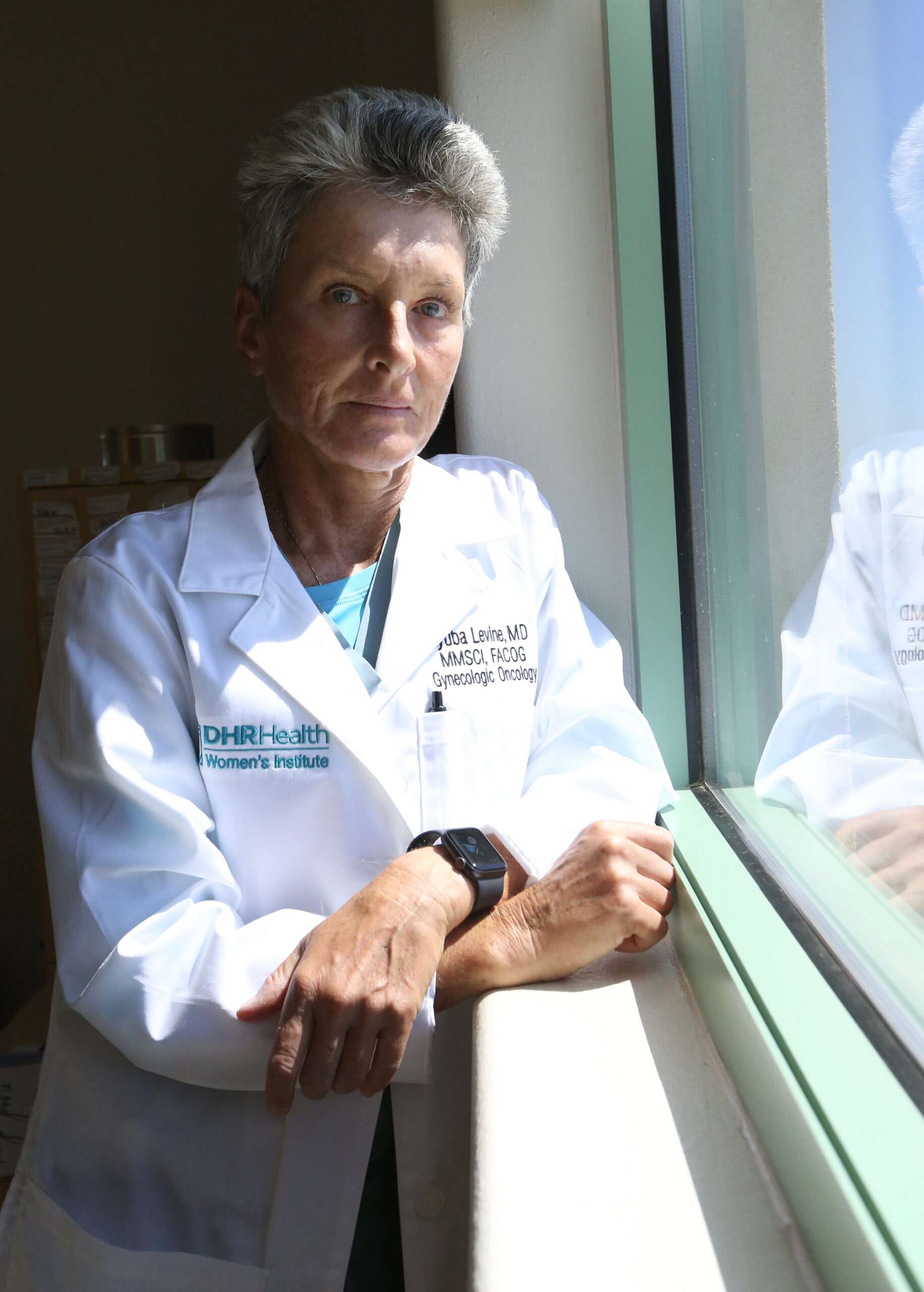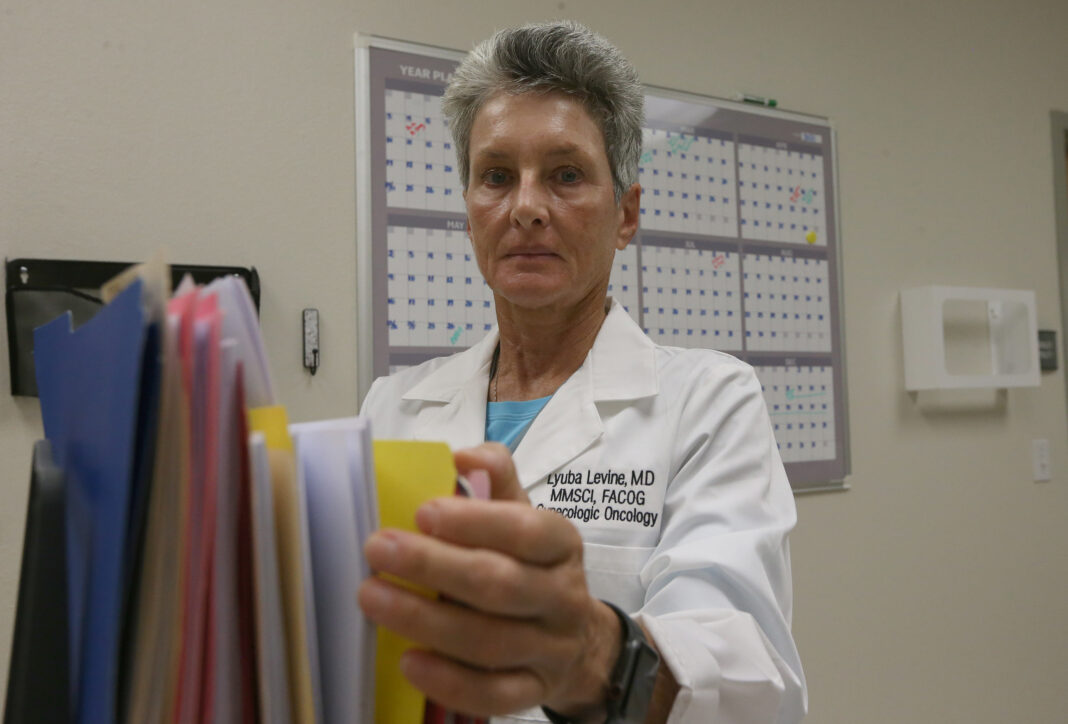From caregiver, to doctor and now breast cancer survivor, Dr. Lyuba Levine has plenty of personal experience to wield as a gynecologic oncologist at DHR Health Women’s Institute, where she’s pulling not just from her professional expertise but her own harrowing story to help her patients.
Despite undergoing her own journey with breast cancer, which began in August 2020, Levine continued to serve her patients even in her most difficult moments.
She has served at DHR Health since 2008 and prior to joining held the title of clinical professor and chief of gynecologic oncology at the University of Texas Rio Grande Valley School of Medicine.
As of last year, Levine has worked for DHR exclusively, where she specializes in minimally invasive surgical care.
Last year, she was diagnosed with stage 1c breast cancer. The high risk cancer required her to undergo a round of chemotherapy and a double mastectomy.
This February, Levine was declared cancer free and is now on hormonal treatments.
“I didn’t feel super bad during chemotherapy, I didn’t feel super good during chemotherapy,” she said. “I stayed at work. I didn’t miss days. I did not feel that me not feeling too great would justify me not working and taking care of my patients, which was a blessing in a way because coming to work not feeling good but actually going through the day, I would end up feeling much better at the end of the day.”
Levine vows that having the right mix of diet, exercise and a positive mindset plays a big role in treatment.
For her, continuing to go to work made her feel stronger mentally and physically.
“Mentally because I knew I did something good,” she added.
Levine said she once had to operate on two patients while feeling the fatiguing effects of her own chemotherapy.
“By the end of the day I was perfectly fine,” she said. “So, that taught me a lesson about how much I can push and what I need to do. So, from there on it was really [about] staying with my diet and staying with my exercise program. When I didn’t have cases I dragged myself to the tennis court at the end of the day, whether I wanted to or not, and believe it, I would feel better.”

Levine said she has continued to keep up these practices and says they have helped her not feel any symptoms during her hormonal therapy.
Prior to her diagnosis Levine was part of the University of Texas Medical Branch at Galveston’s cancer survivorship program, which helps chemo patients by providing them counseling and stress therapy.
She is proud of the program and attributes the experiences she had there to helping prepare her for her own chemotherapy.
However, Levine’s journey with cancer began long before it affected her own body. After witnessing the effects of cancer through her grandparents in Eastern Europe she decided to dedicate herself to treating cancer patients.
“When I was a teenager and they were dying of cancer, I promised myself that if I do anything in life it will be cancer-related and that’s what I did,” Levine said.
Going through cancer herself only made her beliefs in the therapy she was prescribing stronger.
“It did change my insight because I felt it first hand, chemo fatigue, you know aches and stuff you get, but it only confirmed it and solidified [my beliefs],” she said. “I tweaked a few little things and that makes my interactions with patients even better because now I can tell them I’m in your [same] boat. It’s not the end of the world and the power is in their hands.”
As a cancer survivor Levine encourages women to go to their screening appointments in order to detect cancer early.
Being that she was screened for breast cancer just two years before she was diagnosed, Levine urges women to get screened yearly.
Her advice to women with a strong family history of women with breast cancer is to begin screening 10 years before your youngest family member was diagnosed.
Nationwide 230,000 women are diagnosed with breast cancer a year and only 14,000 are diagnosed with ovarian cancer, according to Levine.
Due to the large number of women affected every year, Levine is part of the breast and cervical program at UTMB to help make sure patients who need services receive funding through the state for free screenings.
She said she understands that it is economically and practically inconvenient to visit a doctor, but said “no money can really buy health and life.”
As previously reported by The Monitor, DHR Health is offering discounted mammograms for the entire month of October to help promote the importance of screening and early detection in breast cancer.
Levine is proud of the fact that she received all of her care at DHR and encourages patients to trust their providers the way she has.
“I got my chemotherapy just downstairs, one flight down from my own office,” she said. “I trust my providers. I think I get superb care better than anywhere else, with my friends by my side. So, people do not need to go anywhere to get superior care.”





